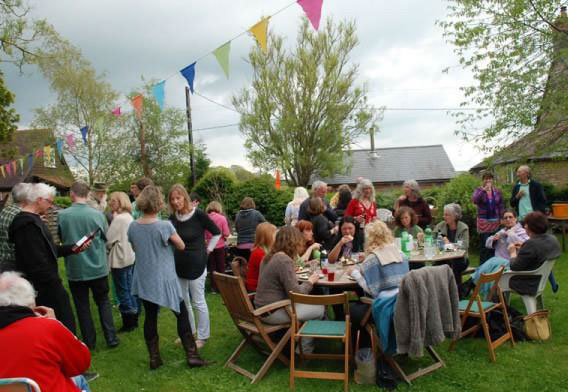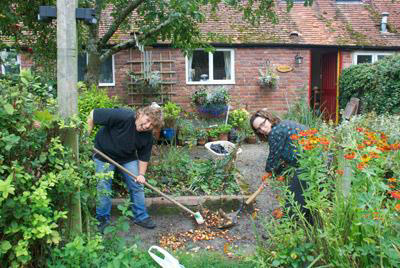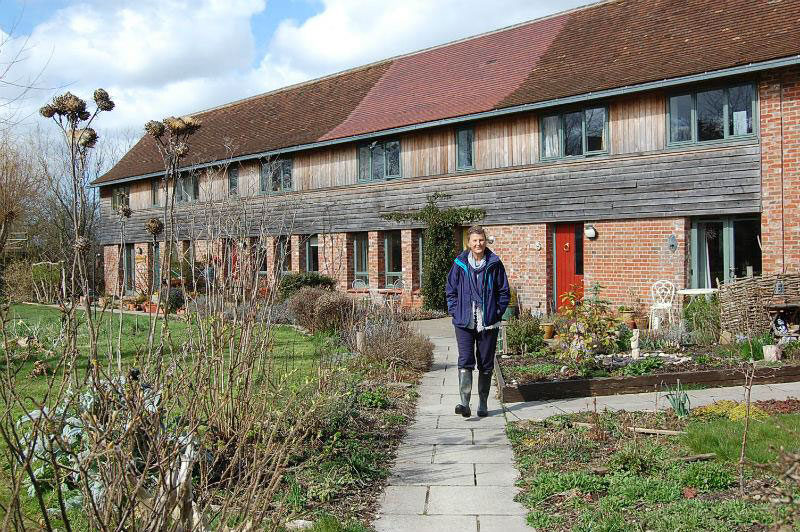Cohousing schemes bring together like-minded individuals who collectively run their own housing. Each household has its own self-contained home, but residents come together to manage their community and share activities. It is a form of housing which helps to tackle alienation and isolation through a strong emphasis on neighbourliness.
The Threshold Centre was the first co-housing scheme in England to involve a partnership between a group of residents and a housing association, providing a mix of owner occupied, shared ownership and social rented homes.
Getting started
The Threshold story started in 2004 when six single people came together to look for a place in Dorset where they could build a spiritual and environmentally sustainable community. They found a farmhouse with seven holiday cottages and two unused barns and agreed a purchase, using the sale of their own properties and mortgage finance to raise the £800,000 asking price.
Living together in the farmhouse initially, the group worked up proposals for providing 12 eco-homes from the existing buildings on the site, plus a learning centre – a reflection of all six having a background in education.
Securing planning approval proved a difficult task initially. The site lay outside the planning envelope of Gillingham in North Dorset and the local authority was not minded to approve an application that did not include a substantial social housing element.

The Group then embarked on a lengthy period of networking, lobbying and open days that helped to raise the co-ownership profile and secure important local support. It was a long haul. With help from a local councillor, it became clear that the group’s initial proposals would have to change; social housing would need to be part of the mix and the farmhouse would better used as a communal building rather than a learning centre.
Five years after the group came together, planning permission was achieved.
Partnering up
The key to securing planning approval lay in the group’s direct approach to a local housing association. Synergy (now part of the Aster Group) had prior experience of working with local communities, particularly on supported housing and was attracted by the unusual nature of the group’s proposals.
Working together, Synergy and Threshold brought forward new plans for 14 homes, including 5 for affordable rent and 2 for shared ownership, plus a common house and a community garden.
North Dorset Council not only approved them, but also provided £20,000 of capital to help fund the scheme. They also supported Synergy and Threshold by lobbying the Homes and Communities Agency to provide a higher than normal grant rate to cover abnormal scheme costs.
“The standard HCA approach to schemes had to be amended to fit with a mixed development of co-owners, shared owners and tenants. The inclusion of various communal features and the cohousing model itself, presented additional complexities to standard HCA leases and tenancy agreements.
In some of the affordable units, the small footprint and other constraints of the existing building envelope, required compromises to achieve thermal performance, without loss of useable living space. Once funding was secured, there was a relatively short programme for scheme delivery in order to comply with the funding timetable. Various other factors associated with location, existing features and absence of mains services certainly upped the total scheme costs, all of which made this a challenging project to pull off.
The Threshold group was, however, very easy to work with. We set up a project team with them at an early stage and our Development Director joined their Board. Although none of the group had any building or technical experience they quickly got their heads around the key issues and were involved at every stage of the design and development process. We helped them secure a design and build contract for the whole scheme, even though Synergy was ultimately only to be directly involved in half of it”.
Chris Moglia Development Manager Synergy Housing (part of Aster Group)

The development partnership has also enabled the Threshold Centre to achieve many of its environmental sustainability aims – particularly reducing waste and lowering its environmental footprint. The scheme includes a bio-mass heating system, a biodigester, solar photovoltaics and a recycling system for water and waste.
The Centre runs regular courses on cohousing, community building and sustainable living, attracting individuals and groups from across the UK; they hold regular retreats for meditation and ‘gardening weekends’ on their one-acre community vegetable plot. They also have a car-sharing scheme.
Managing a mixed tenure cohousing scheme
The success of the partnership with Synergy has extended well beyond the development phase into management. Tenancy selection for the affordable homes is a joint responsibility between Threshold and the housing association. Interested individuals who are registered with the Council’s Home Choice scheme usually spend a weekend at Threshold to see how it works and, if selected, their tenancy
agreements with Synergy require a commitment to be involved in certain communal activities.
There were some initial concerns about how a cohesive group of co-owners would ‘fit’ with people coming into the Synergy properties, but these have proved to be unfounded.
“Threshold is a very low maintenance scheme for Synergy. Everyone there works well together; they are a very self-sufficient group. The ethos is very important for everyone. We put in less management time on this scheme than we do on most of our others”.
Hannah Trussler Neighbourhood Manager Synergy Housing (part of Aster Group)
The association’s role on Threshold’s board has been particularly valuable – something it has now stepped down from. It has combined protecting the landlord’s interest and those of its tenants, acting as an honest broker around changes to the shared ownership leases and service charges and explaining to senior staff in Aster Group how the project works.
“The partnership with Synergy has been very successful. They have provided us with a lot of support and understood what we were trying to achieve. Having a senior officer on our Board was particularly valuable –it helped to iron out any misunderstandings and quickly resolve any problems”.
Jane Stott Threshold Centre founder member

The Threshold Centre is clearly a highly successful scheme that would not have come to fruition without a successful housing association partnership. In many ways it is unique, but that does not mean it is not replicable. The group is currently looking at a second co-housing scheme on a site adjacent to their successful development.
“The earlier we get involved with communities that are interested, the easier and more cost effective it is for us, since we can help to streamline the processes from the outset. Recent changes to housing association funding and the switch of emphasis from affordable rent to low cost home ownership will certainly not make it easier to deliver schemes like this in the future.
Most of Aster’s development programme is comprised of much larger projects, which can deliver significant economies of scale. Despite the relatively small scale and high project management resource costs associated with these types of community-led developments, Aster remains very positive about supporting them. Not least this is because it is often the only way of providing much needed affordable homes in rural areas.”
Chris Moglia Development Manager Synergy Housing (part of Aster Group)
